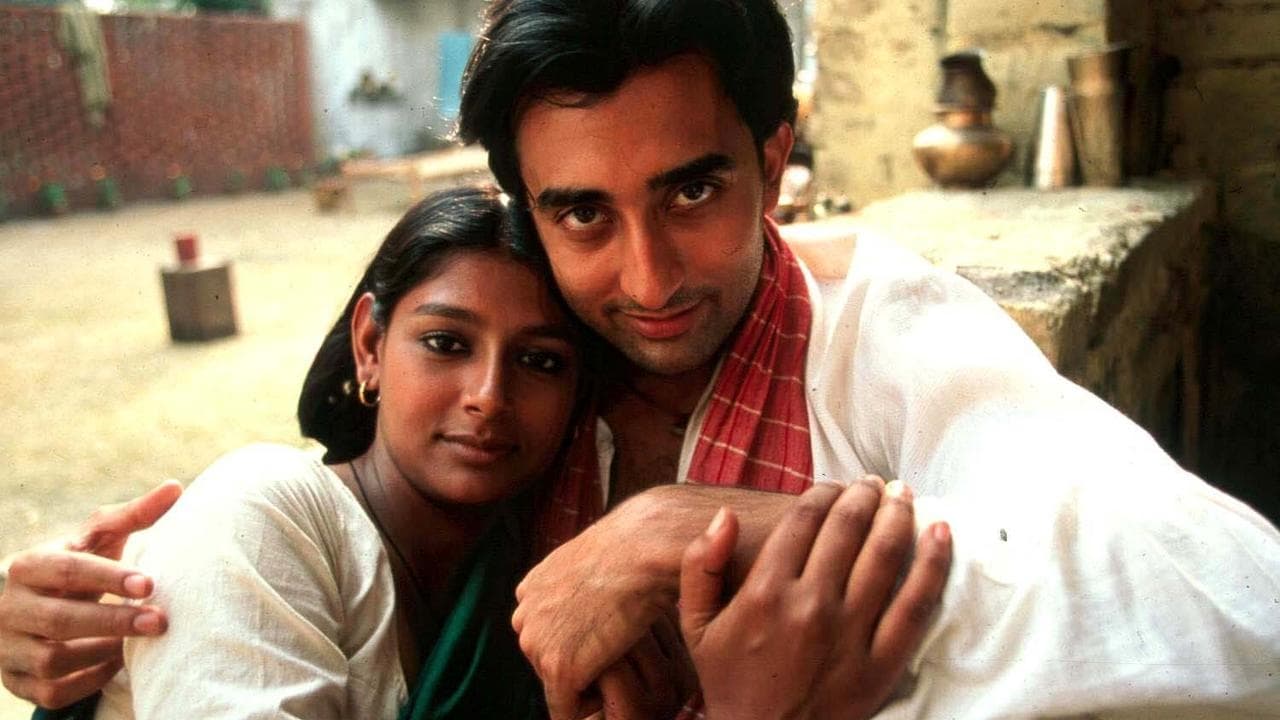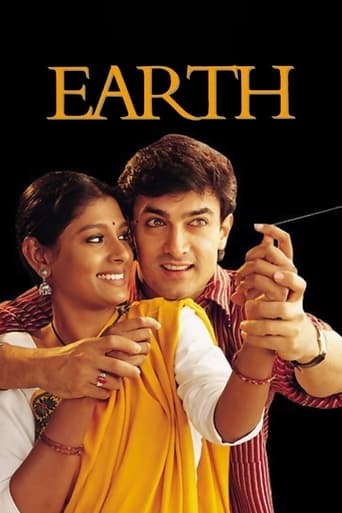

The Indian Independence Act of 1947 was passed in July 18, 1947. Hindus, Muslims, and Sikhs, once living hand in hand in harmony, quickly turned against each other in all out war. Earth, directed by Deepa Mehta is a depressing movie about life in a City named Lahore during the split of India, into two countries, India and Pakistan a month after the act was signed. Lahore is handed over to Pakistan, and Hindus and Sikhs, in a rush migrate to what is now currently India, mostly headed to a city called Amritsar.The movie is set beautifully in Lahore before the chaos. Deepa Mehta shows people living in harmony, such as in a scene when a small group of Muslims, Sikhs are having a picnic, a man named Dil Navaz(aka Ice Candy Man) comes up with a beautiful poem for Lenny(the young daughter of a wealthy Parsee couple). They laugh, and shake hands. This doesn't last very long. People start to get desperate. A little girl is married off to a man, and the same group of friends from the picnic start arguing about which country will get Lahore. Shockingly, one of the Muslims says "We'll put the fear of God up your Hindu trousers," and "Even the British say you Sikhs are a headache, a bloody nuisance." Through this, and many other clues, Deepa Mehta gets her message across: things are falling apart, fast. But Deepa Mehta intentionally adds some hope, giving the viewer suspense, forcing them to infer what is going to happen next. After the derogatory comment by the Muslim man, Hassan, the masseur says "why fight amongst friends? We'll stand by each other, won't we?" and Dil Navaz says "Yes, we'll stand by each other."I really like how makes viewers feel strong waves of sympathy, and doesn't hold back from explicitly showing violent scenes, such as a train massacre on Muslims, and a young Muslim man being torn apart with rope tied to two parts. Deepa Mehta doesn't exaggerate events such as these either. Riots shortly after Independence, and just in a few months people in the millions were killed. In the Riot scene, when numerous Hindu tenements are exploding and catching fire, "firefighters" arrive at the scene. But the "water" that they spray turns out not to be water, but petrol, ironically Dil Navaz, who earlier said "In the eyes of God, we are all equal. You are Hindu, I am Muslim, what's the difference?" this time says "Great! The firefighters must be Muslim." with a glint of delight in his eyes. Earth is a film masterpiece. From the beginning it is enticing. Deepa Mehta's courage in being explicit, especially when the movie is about India and Pakistan is great. Because of her explicitness, which I respect, Earth was banned in Pakistan, and six cuts of the movie were made in India. Mehta's coverage of real-social problems in India is unlike any-other, as shown in her trilogy: Elements Trilogy, which includes Earth. Her use of suspense is really good, with moments throughout the movie, where there are sudden, unexpected changes. This movie portrays the chaos in such a meaningful, touching way that any viewer, even those who are insensitive, will have a soft heart for the victims. I do not recommend this movie to those who are looking for entertainment, but for those who are looking for truth, or those seeking to gain a stronger sense of morality. There was not one point where I lost interest during the movie. I rate this movie a 9/10.
... View More1947 Earth tells the story of the lives of a few people in Lahore in the year 1947 – how their lives were and how they change with the partition. Central idea is good and so is the development of characters but the film fails in the portrayals, especially by the three main ones – Aamir Khan, Nandita Das and Rahul Khanna.The narrative is indulging in parts and most of the film is simply going on and on without much movement in the story. Some of the sequences in the film stand out like the train sequence and the finale. Cinematography by Giles Nuttgens and music by A R Rahman are the few positives in the film, especially the former which is so lively. Only actors who actually act are Maia Lethna as the young Lenny who is perfect for the role, Kitu Gidwani and Khubhushan Kharbanda. Rest all give very 'filmy' performances not matching with the theme. Profanity, nudity and sex in the film do not match with the production design, and rather turn out as offending elements. Certain scenes in the film come and go with no sign and sense e.g. why was the child marriage scene and Lenny's birthday scene inserted in between?I am happy that I saw Earth much after I saw Water and Fire, else had I seen this before, I would never ever have seen the other two gems. Earth is a complete letdown from Ms. Mehta. Movie is strictly not to be watched by the people of India and Pakistan as there are certain elements in the film which may offend them (and I am one of them).
... View MorePartition films are inherently political as is shown by the fact that this utterly fair movie was banned in BOTH countries. The fact that it was banned in both countries indicates how unbiased this film is. This film is one about how hatred consumes all. Dilnawaz (Aamir Khan) is a happy-go-lucky guy who gets consumed by a desire for vengeance when he sees his sisters' bodies mutilated. Dilnawaz had told his Hindu and Sikh friends that he would stand up for them if the partition violence came to fighting. Yet, when it came down to it-he reveled in his Hindu and Sikh friends' misery and even advocated their leaving Lahore. The only heroine in this film is the protagonist's (Lenny, Lenny-Baby) mother, who by virtue of being Parsi is protected but does everything to shield the Hindu Aaya (Nanny) of Lenny.
... View MoreIn 1947, after centuries of colonial rule and 89 years of the British Raj, the Indian subcontinent was finally given long overdue independence. The quest for independence, as lead most famously by Mahatma Ghandi, gave rise to the issue of how to grant it. In the end, sectarian agitations led to the bloody partitioning of India. From British India emerged the Hindu majority India and the Muslim majority Pakistan, accompanied by massacres, riots and "the largest, most terrible exchange of population known to history." It is during this most horrific of schisms that "Earth", directed and part-written by Deepa Mehta, takes place. "Earth" is set in the large cosmopolitan city of Lahore, as it transfers from Indian to Pakistani rule, and is shown from the perspective of a young, lame Parsee girl, called Lenny (Maia Sethna), and her group of friends. This group is a relative microcosm of Indian society, with Muslims, Hindus, Sikhs and Parsees all represented. As the film progresses, Mehta uses the tensions that surface and eventually destroy the group as a parallel to the hostilities of the Partition.As Parsees, India's "invisible" people, Lenny's wealthy family is supposedly sheltered from the growing conflict by an ever-fragile 'neutrality'. Lenny's naïvety is used quite effectively to endear her to the viewer. Her innocence makes the tragedy of Partition even more profound. The events occurring are incomprehensible to Lenny; her naïvety is best illustrated in the opening scene, in which she breaks a plate and, utterly perplexed, enquires "Can one break a country?" The story, though narrated by Lenny at beginning and end, does not always seem to be from her viewpoint and one doubts if she could accurately be described as the protagonist.Lenny's Hindu ayah, or nanny, appears to be more of a focus. Shanta (Nandita Das) is beautiful, and is surrounded by a circle of male admirers, and, in particular, two Muslims suitors who vie for her affection. One is the poetic Dil Navaz (Aamir Khan), or as Lenny calls him, Ice Candy Man, and the other is a masseuse, Hassan (Rahul Khanna). Although it initially seems that it is with Dil Navaz that her affections lie, Hassan proves to be her true love, much to the surprise of the viewer. Whilst it is never really shown why Dil Navaz's courtship fails, the viewer could infer that it he lacked a certain gentlemanliness and that he possessed a certain darkness. What is clear is the love that Hassan has for Shanta; a love that is realised in a beautifully handled love-scene. Shanta is a woman for which he would convert to Hinduism and risk his life.Mehta does not shy away from depicting the savagery of the conflict and the film possesses some extremely powerful moments. One in particular is the debilitating and horrifically gruesome 'de-limbing' of a man caught in the fury of a mob. Another, arguably most powerful, scene is the discovery of a trainload of massacre victims by Dil Navaz, among them his sisters, and sacks of severed breasts. The climax of the movie is a devastating illustration of the consequences of unrequited love. In the scene, we see the supposed protection of the Parsees crumble as an enraged Muslim mob arrives seeking Hindus and Sikhs. Shanta, a Hindu, is hidden in the house, as the mob questions workers who have converted from Hindu and Sikh to Muslim and Christian and then demands Shanta. Dil Navaz, played deftly by Aamir Khan, appears from the crowd, and appearing a "hero", deceives Lenny into revealing Shanta's whereabouts who is then dragged away screaming, and presumably murdered.Based on the novel "Cracking India", by Bapsi Sidhwa (who co-adapted the script), the film translate to screen in a rich, flowing melodrama. It is strong in symbolism and the obvious motif of 'breaking' (plates, persons, dolls and relationships) works to keep the Partition in frame-of-mind. Mehta has created a sensual piece of dazzling colours that correspond with the moment in time in the first half it is joyful and organic, in the second it is dark and ominous. The accompanying soundtrack, by A.R. Rahman, is effective and appropriate. However, the film sits awkwardly betwixt the style of 'Bollywood' and that of Hollywood. It has, one could argue, obviously been made with a Western audience in mind, and consequently, does not set to be historically informative. Nevertheless, it is an effective piece that does not befuddle the viewer, and provides insight into how people were directly affected by the Partition, an event that still reverberates today.(S. R. Watson, Flinders University, Adelaide)
... View More